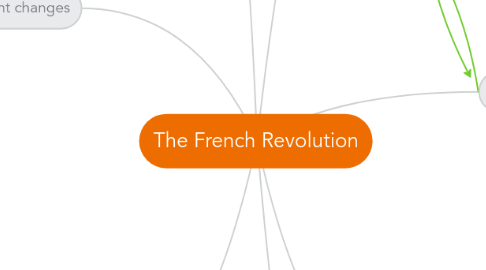
1. Revolution leading events
1.1. Estates General called
1.1.1. Third estate wanted voting by head
1.2. Not granted, so National Assembly formed
1.2.1. Wanted to write up a constitution
1.2.2. Meeting place locked, Tennis Court Oath
1.2.3. France then had a parliament
1.3. Bastille stormed
1.3.1. Contained all arms + king's criticisers
1.3.2. National Guard formed to defend from king's troops marching on Paris
1.3.3. Symbol of the king's power
2. Important changes
2.1. Banned the feudal system
2.2. Declaration of the Rights of Man and of the Citizen
2.3. Slogan : liberté, égalité, fraternité
3. Maximilien Robespierre
3.1. Start
3.1.1. "Incorruptible one"
3.1.2. Jacobins
3.2. King's execution
3.2.1. Flight to Varennes (due to Civil Constitution of the Clergy)
3.2.2. Republic can't have a King
3.2.3. Outbreak of war: Louis charged with high treason
3.2.4. National convention , newly formed parliament, sentenced him to death
3.3. Reign of Terror
3.3.1. Revolutionary enemies
3.3.1.1. Unpopular religious changes
3.3.1.2. King had many supporters, still
3.3.1.3. France at war
3.3.2. Committee of Public Safety
3.3.2.1. Law of Suspects
3.3.2.2. Once accused of guilt, MUST prove innocence or guillotine assumed
3.3.3. Sans-culottes
3.3.3.1. Robespierre still in power because bread kept cheap
3.3.4. Robespierre falls
3.3.4.1. Wouldn't stop using terror after Austria defeated
3.3.4.2. Killed 40,000
3.3.4.3. Convention feared they were next, executed Robespierre
3.3.4.4. Directory then formed
4. Background
4.1. Louis XVI
4.1.1. Bad at making decisions
4.1.2. Wife was Austrian and controlling
4.2. Estates system
4.2.1. First estate
4.2.1.1. Clergy
4.2.1.2. 100,000 people
4.2.1.3. 10% of land
4.2.1.4. Tithe
4.2.2. Second estate
4.2.2.1. Nobles
4.2.2.2. 400,000 people
4.2.2.3. Advisors, judges, generals
4.2.3. Third estate
4.2.3.1. Bourgeoisie
4.2.3.1.1. Educated, skilled people
4.2.3.1.2. No rights
4.2.3.2. 95% of population
4.2.3.3. Commoners
5. Causes
5.1. The Enlightenment
5.1.1. Didn't agree with king's absolute power
5.1.2. Thought religion was superstition
5.1.3. Felt ordinary people should get more say
5.2. Taxes
5.2.1. Resistance of nobles
5.2.2. Unfair nature
5.2.2.1. Nobles didn't have to pay some that peasants did
5.2.2.2. Feudal dues
5.3. The American Revolution
5.3.1. Introduction of ideas
5.3.2. Bankrupt France
